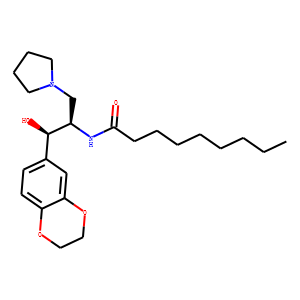| InChI | InChI=1S/C24H38N2O4/c1-2-3-4-5-6-7-10-23(27)25-20(18-26-13-8-9-14-26)24(28)19-11-12-21-22(17-19)30-16-15-29-21/h11-12,17,20,24,28H,2-10,13-16,18H2,1H3,(H,25,27)/t20-,24-/m1/s1 |
| Reference | 1. Nat Med. 2010 Jul;16(7):788-92. doi: 10.1038/nm.2171. Epub 2010 Jun 20.<br />
Inhibition of glucosylceramide accumulation results in effective blockade of polycystic kidney disease in mouse models.<br />
Natoli TA(1), Smith LA, Rogers KA, Wang B, Komarnitsky S, Budman Y, Belenky A, Bukanov NO, Dackowski WR, Husson H, Russo RJ, Shayman JA, Ledbetter SR, Leonard JP, Ibraghimov-Beskrovnaya O.<br />
Polycystic kidney disease (PKD) represents a family of genetic disorders characterized by renal cystic growth and progression to kidney failure. No treatment is currently available for people with PKD, although possible therapeutic interventions are emerging. Despite genetic and clinical heterogeneity, PKDs have in common defects of cystic epithelia, including increased proliferation, apoptosis and activation of growth regulatory pathways. Sphingolipids and glycosphingolipids are emerging as major regulators of these cellular processes. We sought to evaluate the therapeutic potential for glycosphingolipid modulation as a new approach to treat PKD. Here we demonstrate that kidney glucosylceramide (GlcCer) and ganglioside GM3 levels are higher in human and mouse PKD tissue as compared to normal tissue, regardless of the causative mutation. Blockade of GlcCer accumulation with the GlcCer synthase inhibitor Genz-123346 effectively inhibits cystogenesis in mouse models orthologous to human autosomal dominant PKD (Pkd1 conditional knockout mice) and nephronophthisis (jck and pcy mice). Molecular analysis in vitro and in vivo indicates that Genz-123346 acts through inhibition of the two key pathways dysregulated in PKD: Akt protein kinase-mammalian target of rapamycin signaling and cell cycle machinery. Taken together, our data suggest that inhibition of GlcCer synthesis represents a new and effective treatment option for PKD.<br />
2. Diabetes. 2007 May;56(5):1210-8.<br />
Inhibiting glycosphingolipid synthesis improves glycemic control and insulin sensitivity in animal models of type 2 diabetes.<br />
Zhao H(1), Przybylska M, Wu IH, Zhang J, Siegel C, Komarnitsky S, Yew NS, Cheng SH.<br />
Previous reports have shown that glycosphingolipids can modulate the activity of the insulin receptor, and studies in transgenic mice suggest a link between altered levels of various gangliosides and the development of insulin resistance. Here, we show that an inhibitor of glycosphingolipid synthesis can improve glucose control and increase insulin sensitivity in two different diabetic animal models. In the Zucker diabetic fatty rat, the glucosylceramide synthase inhibitor (1R,2R)-nonanoic acid[2-(2/',3/'-dihydro-benzo [1, 4] dioxin-6/'-yl)-2-hydroxy-1-pyrrolidin-1-ylmethyl-ethyl]- amide-l-tartaric acid salt (Genz-123346) lowered glucose and A1C levels and improved glucose tolerance. Drug treatment also prevented the loss of pancreatic beta-cell function normally observed in the Zucker diabetic fatty rat and preserved the ability of the animals to secrete insulin. In the diet-induced obese mouse, treatment with Genz-123346 normalized A1C levels and improved glucose tolerance. Analysis of the phosphorylation state of the insulin receptor and downstream effectors showed increased insulin signaling in the muscles of the treated Zucker diabetic fatty rats and diet-induced obese mice. These results suggest that inhibiting glycosphingolipid synthesis can significantly improve insulin sensitivity and glucose homeostasis and may therefore represent a novel therapeutic approach for the treatment of type 2 diabetes.<br />
|

